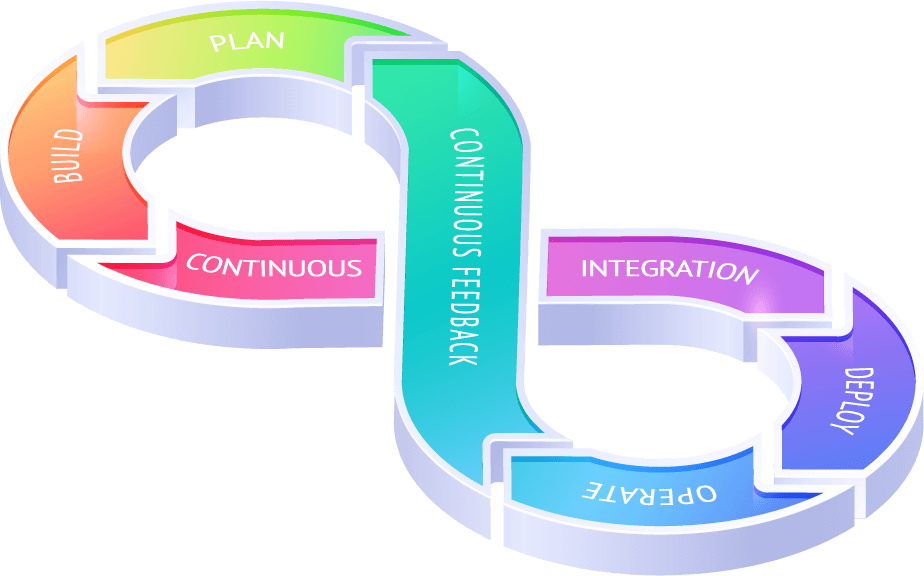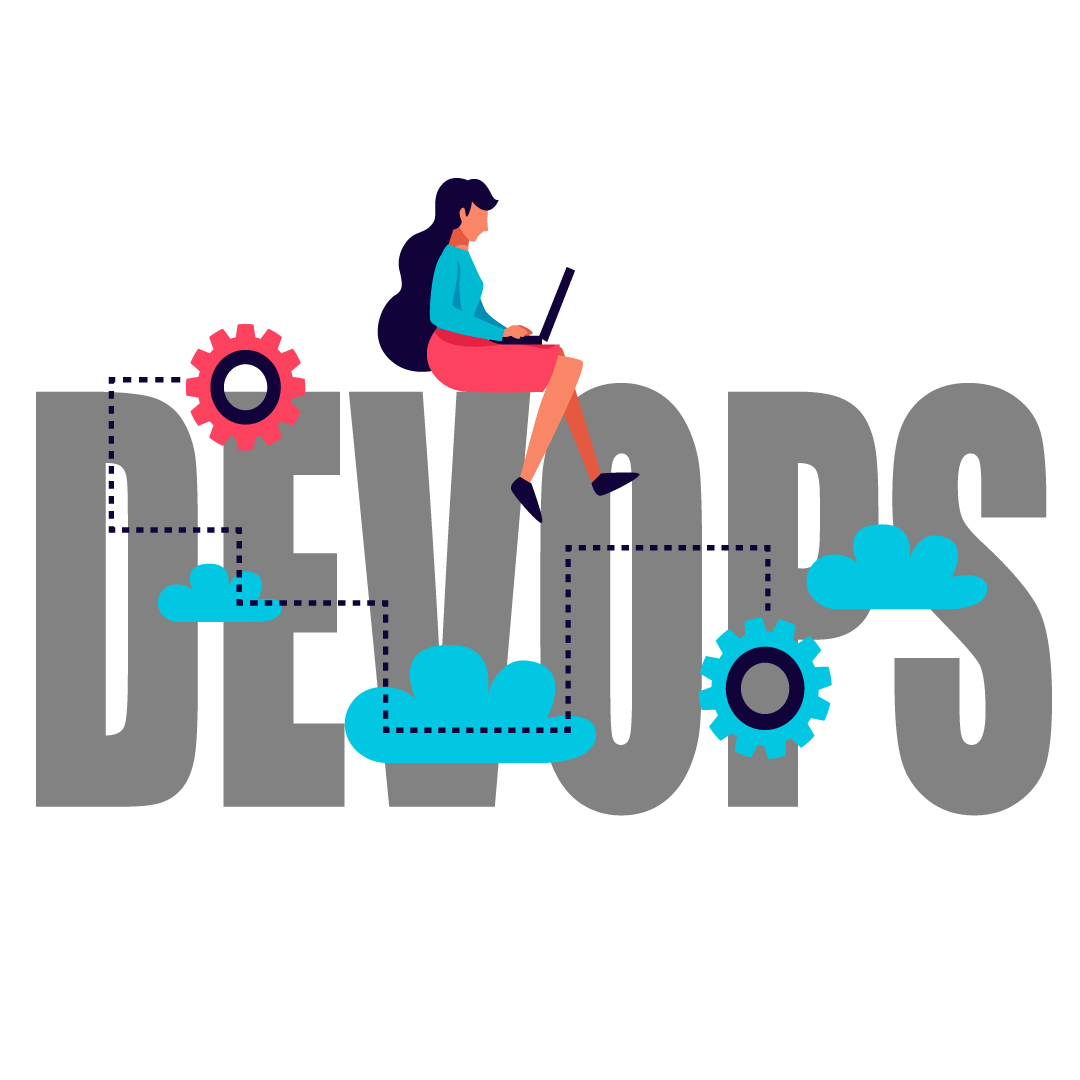DevOps Consulting – Transform Your IT Operations with DevOps
DevOps8 offers end-to-end DevOps consulting services based on the modern methodologies designed to deliver high-quality software faster. Our team is savvy in applying infrastructure as code (IaC), continuous integration and continuous delivery (CI/CD) approaches. Our DevOps experts will help you align your development and operations to achieve the increased frequency of software releases and improve its reliability.

WHAT DEVOPS CONSULTING BY DEVOPS8 INCLUDES
Guiding through end-to-end DevOps implementation
To turn your DevOps initiative into a successful DevOps practice.
1. Strategic planning
We hold interviews and meetings with CIO, the managers of the development, infrastructure, and security departments to get the vision of how the delivery processes works, what are the concerns and expectations of different departments related to software development and operations. Our experts analyze the readiness of your company for DevOps, application portfolio, available IT resources, and your IT infrastructure size and characteristics, and:
- Present strategic advantages DevOps implementation may bring to your software delivery process depending on your business priorities, current situation, and industry specifics.
- Define the business objectives for the DevOps initiative to support, such as the improved application reliability, the increased frequency of software releases, and the improved user experience.
- Estimate the organizational efforts needed to implement DevOps and define how the DevOps initiative will influence interdepartmental dynamics.
- Develop a DevOps strategy in close collaboration with your IT management.
2. Creating a DevOps implementation roadmap
Once a common plan is drawn up, ScienceSoft’s DevOps consultants:
- Design the containerization approach. We suggest applying containerization to achieve software portability across cloud and on-premises environment, ensure that software works uniformly in development, testing, and production environments. With all the executables, libraries and configuration files inside, containers created with Docker, Podman, or other similar tools, allow for easy and consistent deployment of applications. Our DevOps consultants suggest using such container orchestration tools as Kubernetes or Apache Mesos to simplify the containerized application deployment.
- Design a CI/CD solution. ScienceSoft’s DevOps team designs a CI/CD approach, defines and configures the set of CI/CD tools (e.g., Jenkins, GoCD) to increase visibility over the development pipeline, automate and speed up software delivery, find and fix application bugs early in the development stage, and improve software quality.
- Advise on software test automation. To automate functional, integration, performance, load testing, ScienceSoft’s DevOps team suggests applying such tools as Selenium, Appium. Thus, you will be able to accelerate the delivery of software to users and increase its overall quality. Further QA consulting can help you determine the necessary test automation level and improve testing quality.
- Design a way to integrate infrastructure automation with CI/CD tools. Our DevOps experts help to integrate infrastructure automation tools like Ansible, Chef, and Puppet with CI/CD tools, such as GoCD, Jenkins, Bamboo. Thus, you can deploy new software releases and implement infrastructure changes faster.
- Design an application monitoring solution. To ensure the flawless performance of your applications and detect errors quickly, our DevOps consultants can properly plan the configuration of an application performance monitoring tool like Zabbix or Nagios. Thus, your DevOps practitioners will be able to detect post-release bugs before software users encounter them.
- Prepare the detailed DevOps implementation plan. ScienceSoft’s team builds a comprehensive plan to implement DevOps across your IT environment. Our DevOps team assesses your overall readiness to switch to DevOps, and defines the most beneficial way to adopt CI/CD and IaC, align development and testing environments with production, arrange code repository with version control, automate development and operational processes.
- Define DevOps-specific challenges and elaborate solutions. ScienceSoft’s consultants help companies to outline DevOps-specific challenges (e.g., the lack of necessary competencies, legacy applications difficult to containerize) on the way to successful DevOps implementation and draw up a comprehensive plan on how to avoid or mitigate them.
- Present strategic advantages DevOps implementation may bring to your software delivery process depending on your business priorities, current situation, and industry specifics.
- Define the business objectives for the DevOps initiative to support, such as the improved application reliability, the increased frequency of software releases, and the improved user experience.
- Estimate the organizational efforts needed to implement DevOps and define how the DevOps initiative will influence interdepartmental dynamics.
- Develop a DevOps strategy in close collaboration with your IT management.
3. DevOps solution setting up
DevOps8’s consultants help you properly implement the DevOps approach by:
- Applying their knowledge together with practical skills to provide training for your IT system administrators, project managers, program managers, delivery managers, developers, software test engineers, and other DevOps practitioners.
- Introducing the IaC approach to automate and simplify the process of new infrastructure configuration for software development and align the development, testing, and production environments. This will allow you to avoid human errors leading to infrastructure misconfigurations.
- Assisting in the deployment and configuration of CI/CD and test automation tools.
4. Supporting DevOps at the production stage
DevOps8 is ready to support your DevOps practitioners until all the objectives are achieved. Our DevOps experts can provide help with maintaining the operability of the software infrastructure, implementing changes in it, ensuring a proper load distribution within the customer’s IT environment.
Initial organizational and technical help with DevOps implementation
To give your DevOps implementation initiative the right start.
DevOps8’s DevOps team carries out strategic planning, develops a detailed DevOps implementation roadmap, assists in the DevOps solution setting up. Once these steps are completed, DevOps8’s consultants are ready to provide on-premises training for your employees involved in the DevOps approach implementation to ensure their readiness to maintain the DevOps approach on their own and, if needed, cope with organizational (e.g., teams’ collaboration issues) or technical (e.g., CI/CD configuration errors) problems that may occur in the future.
Help with DevOps implementation problems
To cope with any difficulty on the way to a successful DevOps practice.
In the course of implementing DevOps, you may find out that the collaboration between the development, testing and operations teams is insufficient, the employees have knowledge gaps on applying DevOps methodologies and using appropriate tools, the automated testing coverage is not enough to ensure faster and efficient testing. Once the DevOps approach implementation encounters difficulties, DevOps8’s DevOps consultants are ready to:
- Analyze the problem you’ve encountered.
- Adjust or modify the developed DevOps strategy in collaboration with your IT department.
- Tune CI/CD tools, as well as infrastructure management, test automation, and application monitoring processes.
- Offer additional training for your DevOps practitioners.
- Provide software consulting or modernization if needed to adapt your existing development practices to a new DevOps approach faster.
Consulting on DevOps technical aspects
To make technologies fully support your DevOps initiative.
DevOps8’s DevOps experts can design and help to properly set up a CI/CD pipeline. For its successful launch, we install and configure the appropriate set of DevOps specific tools:
- Containerization tools (e.g., Docker, Kubernetes).
- IT infrastructure automation tools (e.g., Ansible, Chef).
- CI/CD tools (e.g., Jenkins, GoCD).
- Test automation tools (e.g., Selenium, Zephyr).
- Monitoring tools (e.g., Nagios, Zabbix).
Once your DevOps toolset is properly configured, DevOps8’s DevOps consultants can train your in-house teams and transfer the knowledge they need to further maintain your agile IT infrastructure.
ADDITIONAL SERVICES TO ENHANCE DEVOPS IMPLEMENTATION
QA consulting
Software consulting
Application modernization
WHEN IT’S TIME TO TURN TO DEVOPS CONSULTING
- The lack of collaboration between the teams (development, testing, system administration, and security) resulting in a slow software delivery and low software quality.
- The slow manual process of providing new IT infrastructure.
- Differences in the configurations of development, testing and production environments.
- Time-consuming infrastructure modifications, software updates and bug fixing.
- Post-release errors affecting user or customer experience or business operations.
- A slow and inefficient testing process due to insufficient test automation.
DEVOPS-SPECIFIC CHALLENGES YOU CAN FACE AND WE CAN SOLVE

Challenge 1
Resistance of employees to the DevOps implementation
CHECK THE SOLUTION
ScienceSoft’s DevOps consultants provide proper training for your development, QA and testing, operations specialists to improve their teamwork skills and achieve their full adoption of DevOps tools and processes (e.g., CI/CD, infrastructure automation).

Challenge 2
Uncertainty about technologies to implement the DevOps initiative
CHECK THE SOLUTION
Considering your DevOps implementation plan, ScienceSoft’s DevOps experts will help you to choose an appropriate set of containerization, CI/CD, infrastructure automation, and other tools aligned with your team’s needs, and configure them correctly.

Challenge 3
Difficulty in adapting legacy applications to DevOps
CHECK THE SOLUTION
We suggest opting for application modernization, including application re-hosting, reengineering, recoding, to overcome difficulties with adapting your legacy applications to DevOps.
